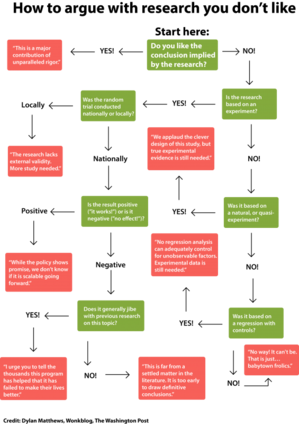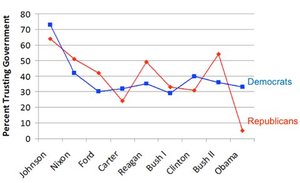The basic concepts behind this model are:
Complementarity. In much the same way that light is both a particle and a wave, Mitt Romney is both a moderate and a conservative, depending on the situation (Fig. 1). It is not that he is one or the other; it is not that he is one and then the other. He is both at the same time.
Probability. Mitt Romney's political viewpoints can be expressed only in terms of likelihood, not certainty. While some views are obviously far less likely than others, no view can be thought of as absolutely impossible. Thus, for instance, there is at any given moment a nonzero chance that Mitt Romney supports child slavery.
Uncertainty. Frustrating as it may be, the rules of quantum campaigning dictate that no human being can ever simultaneously know both what Mitt Romney's current position is and where that position will be at some future date. This is known as the "principle uncertainty principle."
Entanglement. It doesn't matter whether it's a proton, neutron or Mormon: the act of observing cannot be separated from the outcome of the observation. By asking Mitt Romney how he feels about an issue, you unavoidably affect how he feels about it. More precisely, Mitt Romney will feel every possible way about an issue until the moment he is asked about it, at which point the many feelings decohere into the single answer most likely to please the asker.
Noncausality. The Romney campaign often violates, and even reverses, the law of cause and effect. For example, ordinarily the cause of getting the most votes leads to the effect of being considered the most electable candidate. But in the case of Mitt Romney, the cause of being considered the most electable candidate actually produces the effect of getting the most votes.
Duality. Many conservatives believe the existence of Mitt Romney allows for the possibility of the spontaneous creation of an "anti-Romney" (Fig. 2) that leaps into existence and annihilates Mitt Romney. (However, the science behind this is somewhat suspect, as it is financed by Rick Santorum, for whom science itself is suspect.)
What does all this bode for the general election? By this point it won't surprise you to learn the answer is, "We don't know." Because according to the latest theories, the "Mitt Romney" who seems poised to be the Republican nominee is but one of countless Mitt Romneys, each occupying his own cosmos, each supporting a different platform, each being compared to a different beloved children's toy but all of them equally real, all of them equally valid and all of them running for president at the same time, in their own alternative Romnealities, somewhere in the vast Romniverse.
And all of them losing to Barack Obama.
David Javerbaum is the author of "The Last Testament: A Memoir by God."
Continue reading "Quantum Theory of Mitt Romney" »

